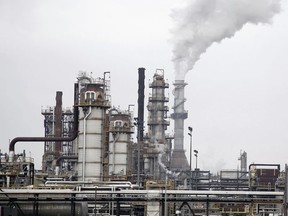The Alberta Energy Regulator (AER) has announced that it will not require an environmental impact assessment (EIA) for the proposed $16.5-billion carbon capture and storage project, known as the Pathways Alliance. The decision has sparked concerns among environmental groups and Indigenous communities.
Background on the Project
The Pathways Alliance is a consortium of oilsands producers, including Canadian Natural Resources Ltd., Suncor Energy Inc., Cenovus Energy Inc., Imperial Oil Ltd., Meg Energy Corp., and ConocoPhillips Canada. The project aims to build a network of carbon capture facilities and pipelines that will link more than 20 oilsands facilities to an underground storage space in the Cold Lake region of Alberta.
No Mandatory EIA Required
Under Alberta’s Environmental Protection and Enhancement Act (EPEA), an EIA is not mandatory for projects like the Pathways Alliance. However, the AER has the discretion to decide whether further assessment or an EIA report is required based on various considerations, including public concerns.
Public Concerns and Criticisms
The Athabasca Chipewyan First Nation (ACFN) and lawyers with Ecojustice had asked for an EIA of the proposed project in February. They expressed concerns about the potential risks of leaks and ruptures from carbon dioxide pipelines, as well as the possibility of CO2 injected underground contaminating groundwater.
"We are concerned that the AER’s decision not to require an environmental assessment will expose our people, our lands, and our waters to significant risks," said ACFN Chief Allen Adam. "We will fight this tooth and nail."
Government Support for Carbon Capture
The federal government has been promoting carbon capture and storage as a way to reduce greenhouse gas emissions in the oilsands sector. The Pathways Alliance consortium is seeking government support to build the network.
"We are committed to reducing our greenhouse gas emissions, and we believe that carbon capture and storage can play an important role in achieving this goal," said Kendall Dilling, president of the Pathways Alliance. "We are working closely with local communities, Indigenous groups, and landowners to ensure that the project is developed responsibly."
Environmental Activities Ongoing
The Pathways Alliance consortium claims that robust engagement is ongoing with local communities, Indigenous groups, and landowners. They also report that environmental field studies are underway and traditional land use studies are being supported by hundreds of heritage resource assessments.
However, environmental groups remain skeptical about the AER’s decision not to require an EIA.
"We urge the federal government to step in and assess the risks associated with this project," said a spokesperson for Ecojustice. "The public has a right to know the potential impacts on our environment and health."
Conclusion
The decision by the Alberta Energy Regulator not to require an environmental impact assessment of the Pathways Alliance project has sparked concerns among environmental groups and Indigenous communities. The consortium claims that robust engagement is ongoing, but critics argue that more needs to be done to assess the risks associated with this massive carbon capture and storage project.
References:

